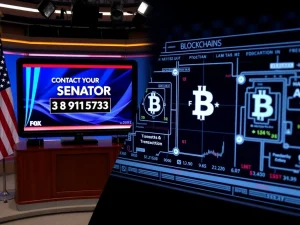Bitcoin: Why Absolute Decentralization is Crucial for Financial Freedom

Are you passionate about the potential of digital money to offer financial freedom? Many entered the world of Bitcoin and cryptocurrency driven by the promise of an alternative to traditional, state-controlled financial systems. Bitcoin’s original vision was bold: to create a currency entirely separate from government and institutional influence. But as the industry evolves, are we staying true to that founding principle?
Returning to Bitcoin’s Core Vision: Separation of Currency and State
Satoshi Nakamoto’s creation aimed to allow individuals to opt out of centralized monetary systems. The core idea was simple yet revolutionary: a currency that could not be manipulated by any single entity, be it a government printing endless money or a bank controlling transactions. This principle of separating currency from state power is fundamental to Bitcoin.
However, the journey since 2009 has seen the blockchain landscape shift. While innovation has brought new capabilities, there’s a growing concern that the industry has, in some ways, drifted from this original ethos. The focus on speed, scalability, and attracting institutional investment has sometimes led to compromises on the very decentralization that gives cryptocurrency its power.
Immutability: Bitcoin’s Shield Against Manipulation
A key strength of Bitcoin lies in its immutability. Its fixed supply of 21 million coins, coupled with predictable halving events, creates monetary certainty unlike any state-issued currency subject to inflation via printing. No government or authority can change Bitcoin’s fundamental rules or supply schedule. This makes it a unique store of value in an era of economic uncertainty.
The difficulty in altering Bitcoin’s protocol rules builds long-term trust. Users can be confident that the network’s properties will remain consistent over time, a stark contrast to traditional financial systems where rules can change based on political or economic pressures.
The Trade-offs of Scalability: Looking at Ethereum and Solana
Networks like Ethereum and Solana have pushed the boundaries of what blockchains can do, offering increased flexibility and performance. Ethereum’s smart contract capabilities enabled DeFi and NFTs, while Solana boasts impressive transaction speeds. However, these advancements often come with significant trade-offs, particularly concerning decentralization.
- Ethereum: While moving towards proof-of-stake, concerns remain about centralization in staking. Large entities, like exchanges, control significant portions of staked Ether. For example, Coinbase controls a substantial percentage of staked ETH, concentrating power among a few large operators. This concentration could potentially pose risks related to censorship or regulatory pressure. Governance decisions affecting gas fees and staking rewards can also centralize influence.
- Solana: Prioritizing speed and throughput has led to higher hardware requirements for running validators, potentially limiting participation to those with significant resources. This can result in a more centralized validator set compared to networks designed for wider participation. While fast, this design choice makes it potentially more vulnerable to control by a smaller group.
These trade-offs weaken resistance to censorship and manipulation by governments, regulators, or powerful corporate interests. The power begins to shift away from the individual user and back towards large, centralized entities, counter to the initial promise of cryptocurrency.
Venture Capital’s Role: Centralization by Investment?
The crypto movement started as a pushback against traditional gatekeepers, allowing anyone to participate early on. However, as the industry matured, venture capital (VC) has played an increasingly significant role. While VC investment can accelerate innovation and adoption, it can also reintroduce centralization.
VC firms often gain significant control through:
- Large token allocations, sometimes at favorable terms.
- Board seats and influence over project direction.
- Structuring incentives towards eventual exits rather than long-term decentralization goals.
Projects receiving substantial VC funding, such as Solana (backed by firms like a16z and Polychain Capital), have seen rapid growth. However, this investment can lead to a concentration of tokens and decision-making power among a handful of early investors. This dynamic mirrors the traditional finance world that crypto sought to escape, where early access and influence are limited to accredited insiders.
Why Decentralization is Not Optional for Cryptocurrency
Decentralization isn’t just a technical feature; it’s the foundation of censorship resistance and individual economic liberty in cryptocurrency. Bitcoin’s design makes it incredibly difficult for any single party to alter its history or prevent transactions. Networks that view decentralization as a compromise risk becoming subject to the same control mechanisms present in traditional finance.
The true strength of Bitcoin lies in its neutrality and immutability, not necessarily in being the fastest or most programmable network. To fulfill the promise of financial independence, the crypto ecosystem must prioritize these core values. Relying on trends or seeking institutional validation risks repeating the mistakes of the traditional system.
Returning to Bitcoin’s original vision—a trustless, censorship-resistant system where currency is truly separate from the state—is essential to reclaiming control over our money and achieving absolute financial independence.
Opinion by: Dr. K, co-founder of Quai Network. This article is for general information purposes and is not intended to be and should not be taken as legal or investment advice. The views, thoughts, and opinions expressed here are the author’s alone and do not necessarily reflect or represent the views and opinions of Crypto News Insights.








